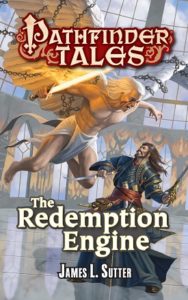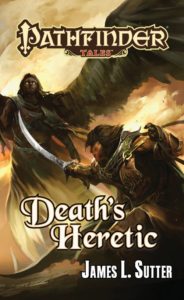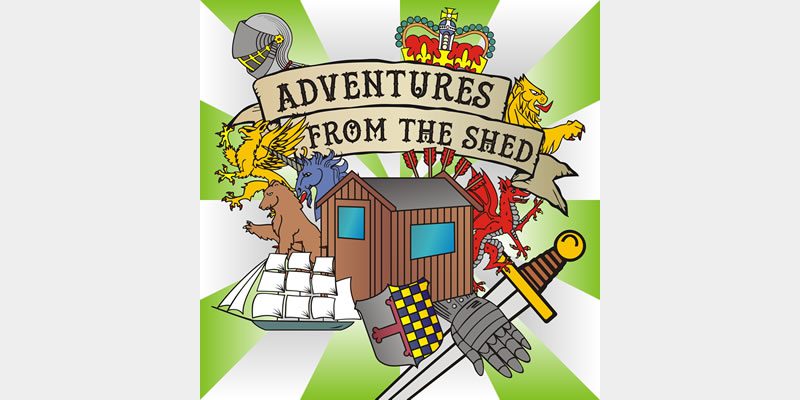Interview with James Sutter – Co-Creator of Pathfinder & Creative Director of Starfinder

First off, what sorts of things do you make & and how would you summarize your career with tabletop gaming?
I’m currently a Creative Director with Paizo Inc., in charge of both the Pathfinder novel line and our new Starfinder RPG, but I’ve been working in tabletop since I was 20. I started out as an intern on Dungeon and Dragon magazines and worked my way up to being an editor and developer there, then helped create both Pathfinder Adventure Path and the Pathfinder Roleplaying Game. Over the years I’ve played a lot of different roles for Paizo and Pathfinder, from development and world design to editing to management, but these days I spend most of my time getting this new science-fantasy RPG off the ground (launching Gen Con 2017!), managing the authors in the Pathfinder Tales novel line, and helping to set the overall creative and strategic vision for the company.
That’s just my day job, though. I’m also a novelist—my novels Death’s Heretic and The Redemption Engine are both Pathfinder tie-ins about a planes-hopping atheist investigator forced to work for the death goddess—and I write short stories, comics (mainly Dynamite’s Pathfinder series), video games, and of course many, many game products for both Paizo and other companies. (I also play guitar and sing in bands, most recently a metal group called Brides of the Lizard God, but that’s just for fun. It’s also mostly unrelated to this interview, but hey, you asked what I make, and the subject matter of our songs and RPGs is pretty similar. 🙂

As co-creator of Pathfinder, Creative Director of the upcoming Starfinder RPG, Author, and musician… I can only assume you don’t sleep. How do you balance all the threads of your creative life?
Obsession and guilt are a powerful combination—I get really uncomfortable if I haven’t been “productive” recently, though in recent years I’ve been able to relax and broaden that category a little. (Going to a party? Relax and enjoy it—building positive social connections counts as productive!) I wish I didn’t need to sleep, but instead, I’m just really careful about rationing my time. I don’t play video games. I watch 2 hours of TV a week. I don’t have kids. When deadlines are bad, I weigh whether a shower is really necessary. While there are definitely people who don’t have time to write—and frankly, I don’t understand how parents manage to get anything done, though many of my successful writer friends have kids—I think that often the time is there, it’s just a question of what you’re willing to give up to make it happen.
That’s one side of the coin. On the other side, I think it’s important to remember that writing is a thing you do for you. Very few writers get rich and famous, so at the end of the day, I write because I enjoy making a thing, I enjoy seeing audiences respond, and I enjoy being around other people making cool stuff. An important realization I had while writing The Redemption Engine is that, regardless of how many books I write, I’m eventually going to die. When I do, what am I going to be proudest of—the books I wrote, or the connections I made with other people and the memories of grand adventures? That realization made it much easier for me to step back from the work and remember to live my life without feeling guilty that I’m not producing or improving as quickly as some of my peers. So while writing may require sacrifice, I recommend rejecting the all-or-nothing approach and making sure the dream is worth the sacrifice. Don’t be afraid to say screw it sometimes and go enjoy your life or chase some other dream as well. Play that guitar. Hang out with your kids. Ride an art car at Burning Man. The book will still be there.
Your mileage may vary—obviously the more work you put in, the faster you’ll advance—but balancing aspirations with enjoyment has been a decade-long struggle for me, and one I still battle with on a daily basis. Learning to pick apart why I’m doing a thing has been hugely beneficial in helping me prioritize.
What’s your gaming ‘origin story’?
My fifth grade teacher, Tom Tivnan, taught a group of us nerdy kids how to play 1st-edition Dungeons & Dragons during our lunch breaks, and I was instantly hooked. Just looking at that old-school, crossword-puzzle-style dungeon map blew my mind… there were so many possibilities! So once that game ended, a bunch of us set to work designing our own RPGs (I remember a big one based off the Redwall books), and pretty soon we were playing every game we could find. I don’t generally idealize childhood, but spending whole days playing RPGs and swimming in the lake was pretty magical, and really set the tone of gaming for me.
What are some of your earliest sources of inspiration? What inspires you now?
 My earliest inspirations for gaming were probably Dungeons & Dragons (with an additional hat tip to Battletech), video games like MicroProse’s immortal Master of Magic, and tons of fantasy novels, especially Patricia C. Wrede’s Enchanted Forest Chronicles, Robert Jordan’s Wheel of Time, and Joel Rosenberg’s Guardians of the Flame series (which first introduced me to t he concept of RPGs). I’m also really grateful that I learned to game from a teacher who specifically didn’t give us access to a bunch of sourcebooks, forcing us to make up our own. For me, RPGs were always about creating things, and the books were just there as a springboard.
My earliest inspirations for gaming were probably Dungeons & Dragons (with an additional hat tip to Battletech), video games like MicroProse’s immortal Master of Magic, and tons of fantasy novels, especially Patricia C. Wrede’s Enchanted Forest Chronicles, Robert Jordan’s Wheel of Time, and Joel Rosenberg’s Guardians of the Flame series (which first introduced me to t he concept of RPGs). I’m also really grateful that I learned to game from a teacher who specifically didn’t give us access to a bunch of sourcebooks, forcing us to make up our own. For me, RPGs were always about creating things, and the books were just there as a springboard.
In terms of what inspires me now… well, obviously in working on Starfinder, I’m drawing a lot of inspiration from science fiction and science fantasy. My favorite SF series of all time is Dan Simmons’ Hyperion Cantos, and you can see a ton of that reflected in both Starfinder and Distant Worlds (the Pathfinder sourcebook on which Starfinder’s setting is based). I also recently devoured James S.A. Corey’s The Expanse, and China Mieville remains a big influence in his reminder that you can take even the wackiest ideas and weave them together into a cohesive whole. (At the start of Perdido Street Station, you’re all “Seriously? Cactus people?” and by the end you’re like “Hell yes, cactus people!”) In film, of course Star Wars is eternal, and folks like Giger and Guillermo Del Toro rock my world with monsters that are utterly alien and instantly evocative. I’ve been reading a ton of great comics as well recently: East of West, The Wicked and the Divine, Saga, Copperhead, The Unwritten… And musically, Starfinder is basically a Coheed & Cambria album.
The honest truth, though, is that I’m very easily inspired. Every time I see something done well—something that moves me emotionally, or captures my imagination—I immediately go “I want to do that!” (I’d probably get a lot more done if I wasn’t constantly, say, impulse-buying a banjo because I saw a great bluegrass band.) But I like to think working in a variety of mediums and genres helps keep me fresh and enthusiastic.

What are some of your favorite things made by other people?
Literally everything I truly enjoy is made by other people, so I have no idea how to answer this question! Every year I have a different set of favorite media, but it’s always tied to that particular point in my life. Like, The Matrix was hugely important to my teenage years and inspired a lot of my science fictional aesthetics, but is it still my favorite? So I’ll just say that the things I’m most addicted to at the moment are Saga, East of West, Wic+Div, the Expanse series, Kristoff & Kaufman’s Illuminae series, and BBC’s Sherlock. (And of course Game of Thrones, because who isn’t?)
In case you mean specifically gaming things… My favorite RPG of the last few years is Dread, because it’s simultaneously practically ruleless and ridiculously tense. On the tactical gaming side, I’ve always loved Heroscape, because of its ease of play and fearless mashing up of genres. And while I sadly don’t get to play a lot of non-Pathfinder campaigns these days, I find companies like Monte Cook Games (Numenera, The Strange) and Posthuman Studios (Eclipse Phase) deeply inspiring—those folks are constantly raising the bar and showing how we can all do things better.
Where do you see the hobby going from here?
Everyone’s always talking about the death of tabletop, but I think we’re in a renaissance. If video games were going to kill tabletop, it would have happened 20 years ago. Instead, we’re seeing that generations raised with both digital and analog games—myself included—are continuing to play both, and between Kickstarter and the improvements in desktop publishing, it’s never been easier for someone with no experience or industry connections to publish a game that people love. If I had to make one prediction about the future of the hobby, I’d say we’re going to see a lot more of that—indy games steadily gaining a greater presence due to online tools and communities.
Can you talk about what you’re working on now/upcoming projects (Starfinder in particular)?
It’s still really early days yet for Starfinder, so I can’t give a lot of specifics. Right now we’re finishing up a lot of broad strokes for both the setting and the rules, putting the class designs through their paces, making sure our spaceship combat system hangs together, locking in the looks for our alien races, etc. Soon we’ll be diving into fleshing out that skeleton and making sure players have tons of gear, spells, and other options. At the same time, a big chunk of my brain as Creative Director is focused on long-term strategy—not just how to get this massive rocketship we’re building off the ground, but how we can best support it in Years 2, 3, 4… It’s honestly pretty exhausting, but every time I start to droop, Creative Design Director Sarah Robinson shows me some new piece of amazing art, and suddenly everything is all sparkly and fun again.
On the novel side, I just this morning saw some great promo art for Sam Sykes’ novel Shy Knives, which is a Pathfinder Tales novel coming up this autumn about which I’m extremely excited. It’s hard for a humorous fantasy novel to win me over, but Sam’s humor comes entirely from the voice of his snarky main character, and I honestly laughed out loud several times reading the manuscript.
What would you like your legacy as a maker to be?
The thing about legacies is that they tend to happen after you’re dead and can’t enjoy them. I also find that thinking about my legacy makes me want my work to be perfect, which is paralyzing as a creator. So instead, I long ago decided to just do the best I can at any particular moment, and as long as some folks say “Hey, that was pretty good!”, that’ll be good enough for me.
That said… I think the legacy I most want to leave behind as a creator (and as a person, really), is being somebody who’s fun, approachable, and cares about people. Someone who builds community. So much of my inspiration as a writer has come from meeting writers I admire and realizing they’re real people, that writing isn’t this mysterious calling you’re born into. If I can be that person for someone else in turn—if I can give a talk on a panel that convinces some new writer to keep at it, or invite someone who feels like an outsider into the industry, or otherwise blur the line someone’s drawn between themselves and “the Pros”—then I’ve made an impact that’ll go far beyond any books I write myself.
Though “that author who sold so many books he funded a colony on the moon” would be a pretty cool legacy, too.
Any themes that come up in your work? How do your personal values/obsessions shape your work (and how are they immaterial)?
I never set out to showcase my values in my work, but I think it’s only natural for them to creep in. For instance, I think it’s important to understand people’s mindsets and how they got to be the way they are, which definitely influences how I write my villains, as well as my desire to write characters that don’t share my own experiences. Everyone’s the hero of their own story, and you need to understand that in order to make them compelling. At the same time, you need to write in that self doubt that everyone has—because in my mind, if your hero never questions his own righteousness, he’s probably not actually a hero.
I also, despite being a devout rule-follower in everyday life, have a deep distrust of authority, which inevitably shows up in my writing. In both Death’s Heretic and The Redemption Engine, the main character, Salim, is a man who actively rejects the worship of the gods despite the fact that they’re empirically real. He’s not an atheist because he doesn’t believe, he’s an atheist because he fundamentally objects to the idea of worship, which he sees as selling your freedom in exchange for security and worldly power. Sure, the gods are powerful, but what right does that give them to mess with mortals? The fact that he makes some bad decisions and ends up as an indentured servant of the death goddess only makes his resentment all the stronger. For me, the best part of Salim is that I don’t always agree with everything he says, and thus writing his theological arguments with other characters is fun because it’s like they’re both trying to convince me.
One area in which my values probably come through most transparently is my belief in the importance of diversity. As I’ve said elsewhere, we at Paizo totally have an agenda, and that agenda is to make our game welcoming to everyone, regardless of gender, race, sexuality, age, body type, etc. There are a lot of ways you can do that, but one of the best is through representation—presenting fully fleshed, sympathetic characters from a variety of demographics. If your audience can see themselves in your heroes, they’re more likely to get invested. For me personally, that’s often meant writing about queer characters, but I’m always trying to learn more about how to write characters of different backgrounds in a way that feels respectful and authentic.
Now that I think about it… I guess almost everything I write has a philosophical or ethical question behind it. Like in The Redemption Engine, the question is all about the role of consent in morality—if you had a magic item that could turn evil people good, would it be ethical to use it? Does a devil that’s born evil really have a choice? I’m quickly bored by black-and-white morality, so I love it when I can find a question with no easy answer that I can then explore in the context of a story or game.
What advice would you give to young makers who are interested in getting involved?
Just do it. Reading “how to” blog posts is great, and there’s never been more information out there than there is right now, but at the end of the day you need to sit down and put in the work. The first thing you make will suck. That’s okay. Make another. At each stage, show people. Submit stories. Enter contests. Go to cons and talk to pros. Cold-call companies you admire and find out how you can get involved—my first paying job at Paizo was pulling product images off the internet at a nickel a jpg. Get experience by making a big list of all the publishers you’d like to work for, start querying at the top, and work your way until someone bites. But the most important thing is that if you want to make something, make that thing. As Steve Martin said, you need to get so good they can’t ignore you. And that takes practice.

—
You can follow James Sutter on Twitter at @jameslsutter, (in addition to Facebook and Google+) website is jameslsutter.com. James adds, “I love to talk to folks, so if you’ve got a question you didn’t see answered here, feel free to tweet it at me!”



